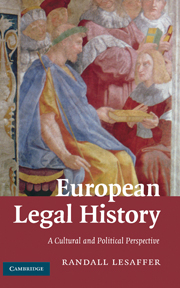Book contents
6 - Ratio (the Modern Age, 1648–1914)
from Part II - The civil law tradition
Published online by Cambridge University Press: 15 August 2019
Summary
A Politics and the state
The Modern Age
This is the generation of that great Leviathan, or rather (to speake more reverently) of that mortall God to which wee owe under the immortal God, our peace and defence.
The French Revolution and the Modern Age
In the spring of 1789, the French Revolution broke out. In the years that followed, the revolutionaries spread their radical ideas at the points of their bayonets throughout Europe. Even the final defeat of Napoleon and the restoration of the monarchy in France in 1815 could not erase the Revolution. A return to the pre-1789 political regime – the Ancien Régime – proved impossible. In all parts of Europe the sovereigns and the old privileged aristocracy henceforth had to share power with the upper middle class, the bourgeoisie. The class system, feudality and royal ‘absolutism’ were now things of the past.
In the field of law as in others, the Revolution caused a watershed. Legal reform stood high on the revolutionary agenda. Napoleon Bonaparte (1799/1804–15) pushed through the codification in France. The French conquest of a large part of Europe ensured that the Napoleonic codes were introduced outside France. In many countries, the end of the Ancien Régime spelled the end of the ancien droit.
It may come as a surprise that the French Revolution is not treated here as a break between two epochs but falls in the middle of the Modern Age (1648–1914). The French Revolution went a long way towards realising the political and legal programme of modernity, which was largely laid out in the late seventeenth and the eighteenth century. However radically and suddenly the Revolution may have struck Europe, the resultant social, political and legal model was no creatio ex nihilo. The impact of the Revolution should not blind us to the continuity between the decades before and after 1789. The fundamental worldview of the late Ancien Régime does not differ in essence from that of the early nineteenth century. Before 1789, modernity was still in the making, while after 1815 it was more in place; but in both cases faith and confidence in the unbridled possibilities of human reason were central.
- Type
- Chapter
- Information
- European Legal HistoryA Cultural and Political Perspective, pp. 372 - 480Publisher: Cambridge University PressPrint publication year: 2009



